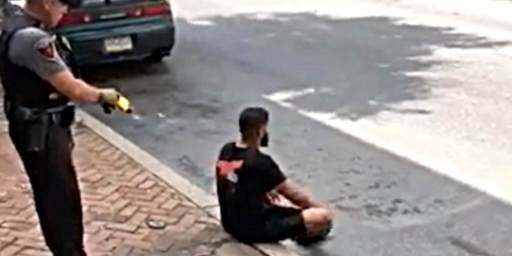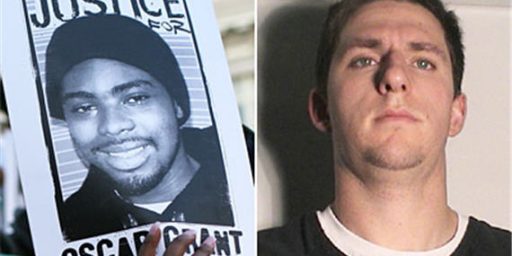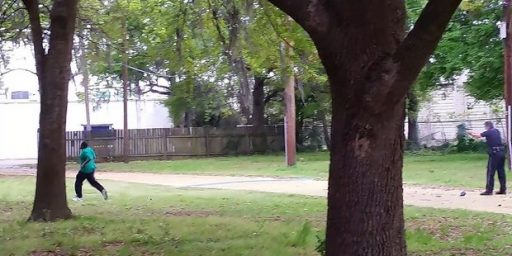Police Taser Use: Cost-Benefit Analysis
 In response to a commenter’s assertion in my Police Taser Deaf, Retarded Man post that “officers are killed in the line of duty are the time,” Jim Henley retorts, “Define line of duty and all the time.”
In response to a commenter’s assertion in my Police Taser Deaf, Retarded Man post that “officers are killed in the line of duty are the time,” Jim Henley retorts, “Define line of duty and all the time.”
Kelley Vlahos does just that in a piece for The American Conservative. The numbers are surprising:
According to federal statistics, the number of police officers shot and killed in the line of duty is at an historic low. The nationwide number actually dropped 40 percent — from 68 in 2007 to 41 in 2008. The numbers have been on a downward trajectory for years, and Tasers are in part, credited. But there are other reasons, too, like the fact that overall violent crime is down, police wear super high-tech bullet-proof vests today and some 2.3 million Americans are incarcerated and off the streets.
Meanwhile, the stats on the number of American citizens police have killed in that timespan are much more elusive. According to this 2007 report (unverified), 9,500 people were killed by cops from 1980 through 2003, an average of 380 a year, one a day. These recent DOJ numbers jibe, with 1,540 killed by police from 2003-2006. Amnesty International says 351 people have died from police Tasers since 2001.
Now, frankly, if those 351 people were all violent criminals who posed a real danger to the police officers or civilians, I could live with that. But that’s not the case.
[A] quick Google News search of the last month alone reveals a barrage of police tasing incidents across the country one more barbaric than the other: grandmas, grandpas, the mentally ill, teens and even children. Some of these taser victims died. One (ok, in Australia) burst into flames, another was left with burns in his anus, and yet another, a 14-year-old girl, got it in the head — running away after a dispute with her mother over a cell phone (caution, graphic).
All — in varying degrees — needed to be “subdued” by police, and were. It is, after all, a most effective tool in that regard, especially when dealing with pregnant women, 16-year-olds with broken backs and 6-year-old boys. After reading news reports dating back to 2004 about the hyper-use of these 50,000-volt zap guns, it’s not difficult to imagine what might have happened if Gates were say, in Boise, and had hurled one more insult, used a few expletives, raised a hand or moved toward Officer James Crowley in a “threatening manner,” much like this guy, who was irate and scary, but nonetheless handcuffed and shackled, when he was Tasered in a Kentucky court on July 22.
When Reason wrote about Tasers in 2005, there were 6,000 law enforcement agencies employing Taser guns. The high-voltage weapons, according to the Amnesty International statistics in the report, “are used on unarmed suspects in 80 percent of the cases, for verbal non-compliance in 36 percent, and for cases involving ‘deadly assault’ only 3 percent of the time.”
Officers do what they’re trained to do and, sadly, that often means bullying citizens and escalating to violent confrontation quite rapidly. Accordingly, if they’re prudent, honest citizens accosted by boorish cops will behave more like Colin Powell than Christopher Hitchens. But we should change the culture so that we don’t have to.
Related: A rather off-color public service announcement from Chris Rock:
UPDATE: Radley Balko points to this positively frightening post by a pseudonymous LAPD officer at NRO.
So, since the president is keen on offering instruction, here is what I would advise he teach his Ivy League pals, and anyone else who may find himself unexpectedly confronted by a police officer: You may be as pure as the driven snow itself, but you have no idea what horrible crime that police officer might suspect you of committing. You may be tooling along on a Sunday drive in your 1932 Hupmobile when, quite unknown to you, someone else in a 1932 Hupmobile knocks off the nearby Piggly Wiggly. A passing police officer sees you and, asking himself how many 1932 Hupmobiles can there be around here, pulls you over. At that moment I can assure you the officer is not all that concerned with trying not to offend you. He is instead concerned with protecting his mortal hide from having holes placed in it where God did not intend. And you, if in asserting your constitutional right to be free from unlawful search and seizure fail to do as the officer asks, run the risk of having such holes placed in your own.
When the officer has satisfied himself that it was not you and your Hupmobile that were involved in the Piggly Wiggly heist, he owes you an explanation for the stop and an apology for the inconvenience, but if you’re running your mouth about your rights and your history of oppression and what have you, you’re likely to get neither.
It’s thinking like that that gives “police state” a bad name. See Radley’s take-down.
Photo by Flickr user hradcanska under Creative Commons license.






Perhaps if cops weren’t boorish, citizens would be more likely to comply with their requests….
No doubt. But when the asshole has a gun, a taser, and a badge, it’s best to save your outrage for another time.
Words we can live by. Seriously.
I think the numbers since 1980 need to reflect a changing part of the mission of the police. With government cutbacks and a new emphasis on keeping the mentally ill in society and not an institution, the police are the first responders for mental illness.
A few years ago, a mentally ill adult who was cared for by his aging parents stopped taking his meds and became too much for them to handle. The police were called and were unable to calm him down, so he was tasered and restrained with holds so that he could be taken to the hospital and treated. He died from some combination of a previous weaknesses in his health, the excitement/shock of the taser and the obstructions caused by the hold. The parents wished they had never called.
This was a big deal and the community was inundated with information from mental health organizations that indicated that this was not uncommon. The PD formed a division trained specifically in mental health calls.
I’m left wondering if this is not the cost-benefit of deinstitutionalization and whether the police would ever be the best responders to such specialized needs.
A friend of mine avoided a DUI by questioning the officers, politely but insistently, about the field sobriety tests. He finally gave up and told her to walk home. Probably helped that she was clearly non-threatening, female, small, and white.
That anonymous police officer posted on Patterico.com. Patterico demolishes Balko for twisting the words.
You can read Patrick’s post for yourselves. It strikes me that Balko’s reading is exactly right.
Patrick says that “Dumphy” is talking about an extraordinarily rare case where an officer has very specific probable cause but it’s nonetheless a case of mistaken identity. Fine. But guess what? The citizen in even that extreme example has no idea that this is what’s going on. So, for all intents and purposes, he has to act is if he might got shot in every encounter with police.
Indeed, Patrick says so:
And, as I say in my original post, he’s exactly right. That’s exactly what a prudent citizen must do given the existence of violent imbecile cops who shoot first and ask questions later.
But it’s not the way it ought to be.
That’s very interesting, because in my TASER training, I seem to recall three categories of people that I was trained not to Tase: the elderly, minors, and pregnant women. Plus a half-category for people you were pretty sure had an injury or asthma.
Just curious, but where do you expect to find enough men and women to staff your perfect police force at their current wages?
Some years ago on my way to a backpacking trip in Glacier National Park I was stopped by an Idaho state policeman after passing him and three other cars at once doing, ah, I don’t remember how fast I was going. But I do remember when I pulled over and had come to a stop that I got out of the car to stretch my legs and the policeman said over his loudspeaker to get back in the car and put my hands on the steering wheel. Now, I was certainly not a threat and I knew that, but I’m just as sure on that rural stretch of road in Idaho that he didn’t. Rather than “assert my constitutional rights” I did what I was asked to do. When the officer got to my car I explained that I had had a very long day and asked if it was ok to get out of the car and stretch whiele he looked over my driver’s license and rental car agreement. He consented, we talked, and I got away with nothing more than a warning to watch out for suicidal deer and moose. The officer wasn’t rude, but he was quite firm and direct. On that rural stretch of Idaho I failed to see the wisdom of being a jerk, just because I could within my “constitutional rights.”
We ask the police to do a dangerous job and I exect them to approach everyone with their guard up. Sure, they don’t have to be buttheads about it, but expecting them all to act like Andy Griffith all the time — especially when thay may well have reason to be more than a little wary — is just loony.
Let’s be careful about drawing too many generalizations from a few bad cases.
When the police are sodomizing people with tasers, I think the problem isn’t the taser. That man was going to come away with significant injuries because of police brutality one way or the other.
Now, if there were statistics for taser deaths and injuries where it was not police brutality, that would be a much more interesting and useful dataset.
“Just curious, but where do you expect to find enough men and women to staff your perfect police force at their current wages?”
It is all just a question of balance. It is understood that in times of stress force is necessary. It is the arresting of people afterwards for no reason that makes no sense. The tasering of elderly, frail, unarmed men and women that makes no sense. Yes, I feel sorry for the police who work with the scum of the earth. I think the war on drugs makes this much worse for them and for all of us. But, I also feel sorry for the poor civilian who, questions an officer and gets tasered. The civilians who are shot, or their pets, when the police make a no-knock raid at the wrong address.
Steve
While I respect cops for facing the risks they do every day, I get a little tired of the “I risk my life” line being used by them continually. They know the risks going in. Its a choice. Don’t want the risks, find another line of work…
Balko’s take is completely wrong. I have more here.
And so is this comment:
“And, as I say in my original post, he’s exactly right. That’s exactly what a prudent citizen must do given the existence of violent imbecile cops who shoot first and ask questions later.”
James, assume that you see a suspect closely matching the description of an armed robber who just knocked over a supermarket. Would you stop that person?
And if you would, then would you order them to hold their hands above their head? Would you cuff them as you checked out their story?
And if they turn out to be innocent, does that mean you are a violent imbecile????
Well, I’m not a cop. But, if I were, I suppose so.
I’ve never been to police academy training but would probably perform a Terry stop, ensuring that they have no weapons, and check their ID. I don’t think you cuff random people matching a physical description.
Only if you shoot them or taser for not being immediately compliant with an out-of-the-blue demand from a cop.
And, again, the problem with all this is that, since the citizen has no way of knowing what misconceptions the cop is acting on, your scenario simply requires that we act like sheep in the face of what strikes us as unreasonable conduct on part of the police. It would be far better to train police better.
James, your use of the word “misconceptions” is extremely prejudicial in your argument. Not knowing whether the person stopped is the perp the police may be looking for and taking the necessary precautions to prtoect themselves while they make the determination is not the same thing at all as having bad or incorrect information.
Not at all. The cop is acting under the presumption that the person stopped is in fact the dangerous perp and fully prepared to gun him down if he makes any sudden moves. That’s a hell of a misconception!
I find it funny that in the last few posts, Charles and Patterico look at the situation ONLY from the POV of the cop, they can’t even imagine putting themselves in the POV of the innocent person who has a cop acting like he thinks you’re a cross between Hannibal Lector and a grenade with the pin pulled.
James, good point about the Terry stop being preferable to just preemptively cuffing people before you do any investigation.
I have several thoughts related to this topic. The first is why should I be afraid of the people who we hired to protect us. They are supposed to be the ones trained to handle situations and the public. They are supposed to represent the constitution and my rights. If they cannot handle the balance between protecting and serving the public and not resort to tasers and spray based on personal insults then they shouldn’t have a badge. They are supposed to rise above not react and strong arm.
I think we do owe them some courtesy as a little kindness goes a long way, but some just take the badge right to their heads and make courtesy impossible. Should we just allow them to storm troop as they feel? I for one think I have the right to object.
“And, again, the problem with all this is that, since the citizen has no way of knowing what misconceptions the cop is acting on, your scenario simply requires that we act like sheep in the face of what strikes us as unreasonable conduct on part of the police. It would be far better to train police better.”
Not understanding your point. If a cop detains a citizen on reasonable suspicion that the citizen has committed a crime, and the citizen turns out to be innocent, does that automatically establish a failure of training on the part of the cop?
Why do you seem hellbent on blaming a cop who is doing his job in a reasonable manner??
Ben, my earlier comment about my stop in Idaho belies your comment. Why is it that so many have to go overboard in seemingly describing all cops as renegades and rogues?
James, how did my “taking precautions to protect themselves” morph into your “gun him down if he makes any sudden moves”? It is the criminal that is creating the dangerous situation for us citizens, not the policeman.
“It is the criminal that is creating the dangerous situation for us citizens, not the policeman.”
Yes, that’s it. You are either a cop or a perp.
As long as you don’t have a spine, free will, self respect, honor, sovereignty, or a love of the constitution you’ll be fine. This way to the egress..
Cops in Portland Oregon get shot when they do stupid stuff. It happens rarely, and in each case the situation is created by the police, not the “criminal”. This isn’t the case in a place like Oakland CA, but kicking peoples doors in is dangerous wherever you do it. That’s cop training leading to cop death.